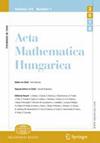从属选择的几何条件
IF 0.6
3区 数学
Q3 MATHEMATICS
引用次数: 0
摘要
我们提供了一个几何条件,它描述了在 Fraenkel-Mostowski-Specker 置换模型中依赖选择原则何时成立。这个条件是对要求群的滤波在可数交集下是封闭的条件的轻微弱化。我们证明了这一条件在我们称之为 "无处密集模型 "的新的换元模型中非绝对成立,并研究了它对不可数红心的扩展。本文章由计算机程序翻译,如有差异,请以英文原文为准。
Geometric Condition For Dependent Choice
We provide a geometric condition which characterises when the Principle of Dependent Choice holds in a Fraenkel-Mostowski-Specker permutation model. This condition is a slight weakening of requiring the filter of groups to be closed under countable intersections. We show that this condition holds nontrivially in a new permutation model we call "the nowhere dense model" and we study its extensions to uncountable cardinals as well.
求助全文
通过发布文献求助,成功后即可免费获取论文全文。
去求助
来源期刊
CiteScore
1.50
自引率
11.10%
发文量
77
审稿时长
4-8 weeks
期刊介绍:
Acta Mathematica Hungarica is devoted to publishing research articles of top quality in all areas of pure and applied mathematics as well as in theoretical computer science. The journal is published yearly in three volumes (two issues per volume, in total 6 issues) in both print and electronic formats. Acta Mathematica Hungarica (formerly Acta Mathematica Academiae Scientiarum Hungaricae) was founded in 1950 by the Hungarian Academy of Sciences.

 求助内容:
求助内容: 应助结果提醒方式:
应助结果提醒方式:


